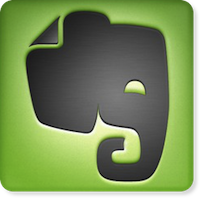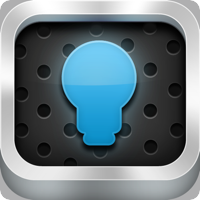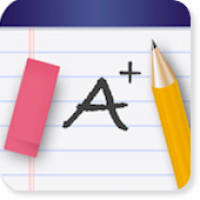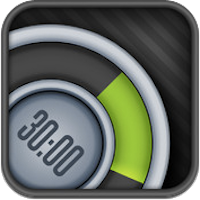Parents of children dealing with the challenges of ADHD often find that digital media can capture their kids’ attention in ways other forms of media simply cannot. The interactive nature of mobile apps offer a particularly engaging way to help children diagnosed with ADHD deal with problem areas such as organization, prioritizing, and impulsivity. From improving academic organization, to setting helpful reminders, apps offer an interactive, fun way for children with ADHD to better manage their daily lives. Check out the apps below for fun, free, easy-to-use tools for helping children with ADHD improve day-to-day life.
Our Top 5 Free Apps for ADHD:
Evernote:
 When it comes to organizational apps, Evernote stands on it’s own as one of the most highly functional — and free — productivity apps for both iOS and Android. A New York Times “Top 10 Must Have App,” Evernote helps kids stay organized, allowing them to save idea, take notes, capture photos, create to-do lists, and record voice reminders. Using the search functions, kids can easily access their entries. Because all the content is consolidated, kids with ADHD can use Evernote as a one-stop solution to their organizational struggles.
When it comes to organizational apps, Evernote stands on it’s own as one of the most highly functional — and free — productivity apps for both iOS and Android. A New York Times “Top 10 Must Have App,” Evernote helps kids stay organized, allowing them to save idea, take notes, capture photos, create to-do lists, and record voice reminders. Using the search functions, kids can easily access their entries. Because all the content is consolidated, kids with ADHD can use Evernote as a one-stop solution to their organizational struggles.
Idea Bucket:
 Impulsive behavior detracts from productivity, causing kids to develop poor project-management skills. Children who have been diagnosed with ADHD tend to procrastinate, as they chase activities that fulfill their needs for outside stimuli. Idea Bucket is on our list for the top 5 free apps for ADHD because it helps kids make thoughtful, well-informed decisions when it comes to ordering and carrying out tasks. A scoring system rates a set of potential activities. This information can then be viewed on a spreadsheet, which allows kids to see which idea ranked the highest overall, ultimately offering a visual way to determine the order in which tasks should be completed.
Impulsive behavior detracts from productivity, causing kids to develop poor project-management skills. Children who have been diagnosed with ADHD tend to procrastinate, as they chase activities that fulfill their needs for outside stimuli. Idea Bucket is on our list for the top 5 free apps for ADHD because it helps kids make thoughtful, well-informed decisions when it comes to ordering and carrying out tasks. A scoring system rates a set of potential activities. This information can then be viewed on a spreadsheet, which allows kids to see which idea ranked the highest overall, ultimately offering a visual way to determine the order in which tasks should be completed.
Audiobooks:
 For parents of children diagnosed with ADHD, finding ways to motivate their kids to read can be challenging. Audiobooks offer an unique way to synthesize written information, allowing kids who struggle to maintain attention while reading a viable alternative. Audiobooks can be a great way to get kid interested in reading, and can serve as a supplemental tool for kids to use while reading along with a written text. This app offers a wide variety of free content to browse and download, along with premium books which can be purchased through the app.
For parents of children diagnosed with ADHD, finding ways to motivate their kids to read can be challenging. Audiobooks offer an unique way to synthesize written information, allowing kids who struggle to maintain attention while reading a viable alternative. Audiobooks can be a great way to get kid interested in reading, and can serve as a supplemental tool for kids to use while reading along with a written text. This app offers a wide variety of free content to browse and download, along with premium books which can be purchased through the app.
[cjphs_content_placeholder id=”78591″ random=”no” ]
myHomework:
 Like Evernote, myHomework is a productivity app, helping kids to develop task management skills. But myHomework is specifically designed for kids who are in school. It is one of the top 5 free apps for ADHD not just because it is highly intuitive, but because it allows kids to set up a personalized homework profile. All assignments that are filed under this tab can be sorted by due date, subject material, or length. While schools tend to issue daily planners to students, myHomework offers more character space, a cleaner display, and a much neater method for categorizing a variety of both school-related and non school-related obligations.
Like Evernote, myHomework is a productivity app, helping kids to develop task management skills. But myHomework is specifically designed for kids who are in school. It is one of the top 5 free apps for ADHD not just because it is highly intuitive, but because it allows kids to set up a personalized homework profile. All assignments that are filed under this tab can be sorted by due date, subject material, or length. While schools tend to issue daily planners to students, myHomework offers more character space, a cleaner display, and a much neater method for categorizing a variety of both school-related and non school-related obligations.
30/30:
 More important than organizing a list of tasks, is one’s ability to carry them out. To help kids with ADHD stay on task, 30/30 integrates a time restriction, enabling kids with the ability to keep track of how long they have dedicated to a particular project as well as when it is time to move on or take a break. Users can can multiple task lists, which have the ability to run in a loop for projects that are repeated often – like reading assignments or math worksheets. The mobile device will vibrate at intervals during a particular period. Users then can gauge their overall productivity, making the appropriate adjustments in order to complete their assignment.
More important than organizing a list of tasks, is one’s ability to carry them out. To help kids with ADHD stay on task, 30/30 integrates a time restriction, enabling kids with the ability to keep track of how long they have dedicated to a particular project as well as when it is time to move on or take a break. Users can can multiple task lists, which have the ability to run in a loop for projects that are repeated often – like reading assignments or math worksheets. The mobile device will vibrate at intervals during a particular period. Users then can gauge their overall productivity, making the appropriate adjustments in order to complete their assignment.




